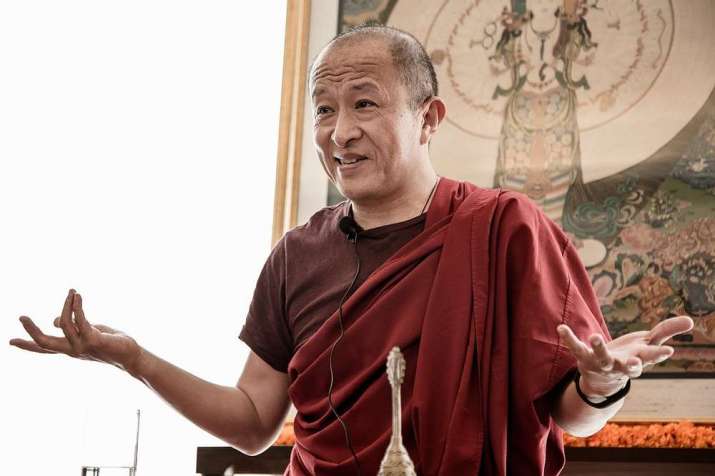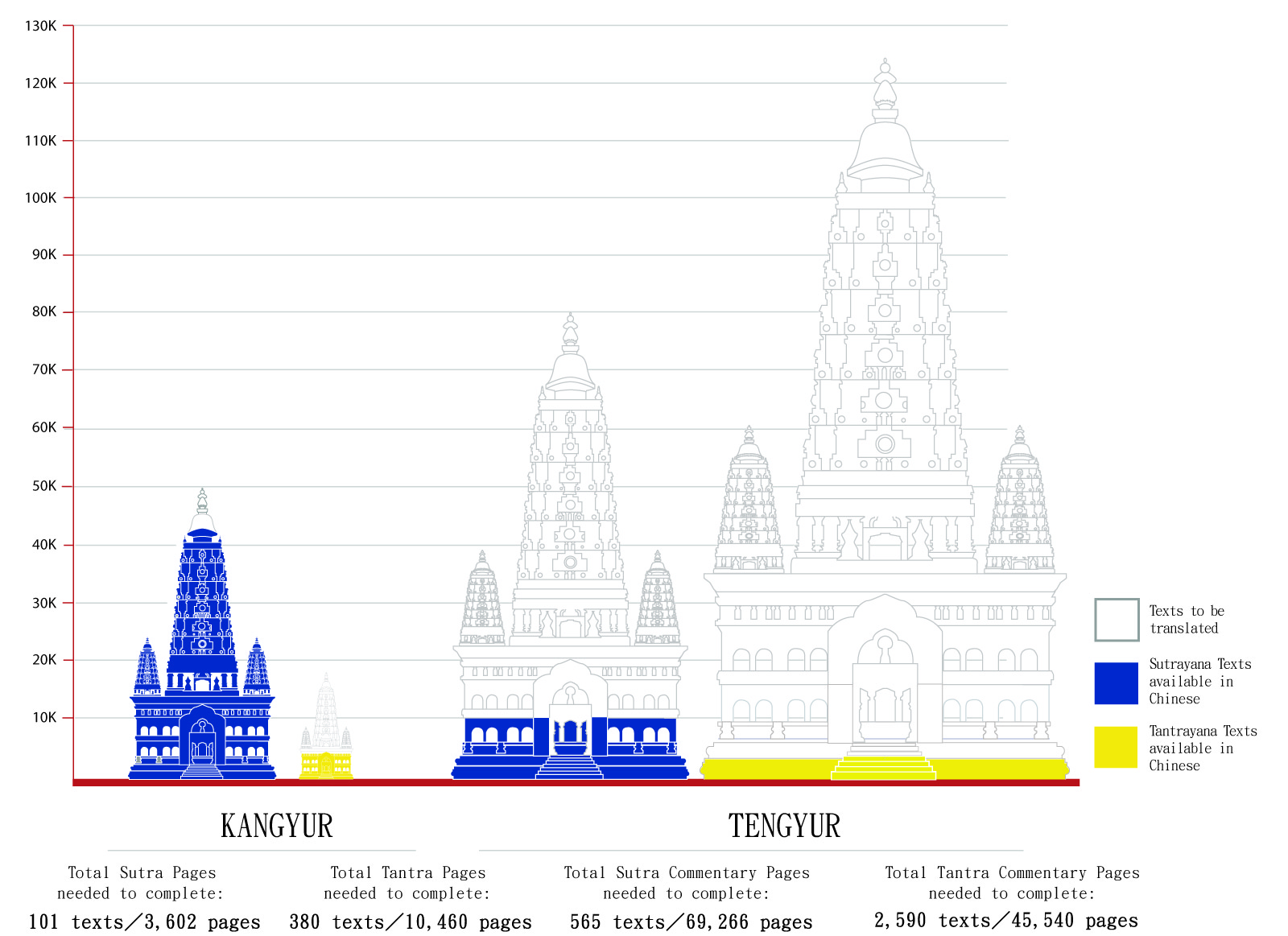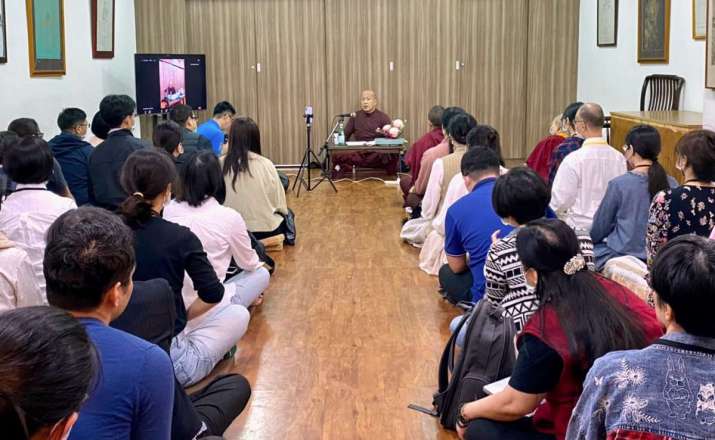
The Kumarajiva Project, an initiative of the Khyentse Foundation, founded by the renowned Bhutanese lama, filmmaker, and author Dzongsar Jamyang Khyentse Rinpoche, has entered into its second year of translating Tibetan Buddhist texts into Chinese,* announcing the first ever Chinese translations of seven Tibetan texts.
The Kumarajiva Project has completed the translation of seven texts from the Tibetan canon into Chinese since July last year. In February this year, the foundation announced the online publication of a Chinese-language version the Sutra of the Questions of Brahma, representing the first Tibetan-to-Chinese translation of a Buddhist text completed by the Kumarajiva Project.** Since then, five more sutras and one shastra have been translated, marking the first time that these texts have ever been translated from Tibetan into Chinese:
Toh 23 The Perfection of Wisdom Mother in One Syllable
Toh 26 The Perfection of Wisdom for Suryagarbha
Toh 27 The Perfection of Wisdom for Candragarbha
Toh 158 The Sutra of the Questions of Brahma
Toh 328 The Sutra of Nanda’s Ordination
Toh 346 The Account of the Noble Deeds of Sumagadha
Toh 4005 The Bodhisattva’s Confession of Ethical Downfalls
“The translation of another 13 sutras and shastras has been completed and they are now in the review and editing process,” said the Khyenste Foundation.

Launched by the Khyentse Foundation in the summer of 2019, the Kumarajiva Project (圓滿法藏-佛典漢譯計畫) is an ambitious initiative to translate canonical Buddhist texts from Tibetan into Chinese, aiming to complete the translation of the Tibetan Buddhist canon—both the Kangyur (the translated words of the Buddha) and the Tengyur (the translated commentaries on the teachings)—into Chinese within 60 years.*
The foundation estimates that nine per cent of the sutras in the Kangyur (4,472 pages) and 65 per cent (10,460 pages) of the tantras do not yet have Chinese translations. In the Tengyur, it is estimated that 86 per cent (69,266 pages) of important scriptural commentaries and 36 per cent (45,540 pages) of tantric commentaries have not yet been translated into Chinese.
The Khyentse Foundation emphasized that while more than half of the world’s estimated 500 million Buddhists are Chinese, numerous Buddhist teachings and commentaries by Indian masters have yet to be translated into the Chinese language. The foundation cited, by way of example, the Tibetan Tripitaka, which includes important commentaries explaining Buddhist sutras and tantras, such as the works of Nagarjuna and Vasubandhu. Similarly, the foundation noted, many important texts can be found only in Pali and Sanskrit Buddhist scriptures. The Kumarajiva Project is therefore aimed at enriching the pool of Chinese-language teachings of the Buddha by eventually translating all scriptural texts from Tibetan, Sanskrit, and Pali.

“To meet the needs of different readers, we are pleased to offer two versions of each Chinese translation of the sutras: one in a modern Chinese style and the other that emulates the traditional Buddhist scriptural style,” Khyentse Foundation explained. “The modern version is available in both traditional and simplified Chinese; the traditional scriptural style is offered in traditional Chinese only. We also provide a Tibetan and Chinese aligned version. So there are four versions for each text which means a lot of extra work for the whole team.”
The Buddhist monk Kumarajiva (344–413) is recognized as one of the greatest translators of Buddhist scriptures into Chinese, and it was in large part due to his efforts that Buddhist religious and philosophical teachings were disseminated in China. Kumarajiva was born in the ancient Buddhist kingdom of Kucha, located on a branch of the Silk Road in what is now Xinjiang Uygur Autonomous Region in northwestern China, and was ordained as a monk at the age of 20. He was raised in the Shravakayana tradition, which he studied in the oasis city of Kashgar, now the westernmost city in China, before later adopting the tenets of the Madhyamaka school of Mahayana.
Khyenste Foundation observed that a lack of qualified translators has been an ongoing challenge to the work of the Kumarajiva Project, which is expected to take several generations to complete. As such, the organization has also begun training a new generation of translators to ensure that qualified scholars are available to complete the sacred mission.
“Khyentse Foundation has been cooperating with the Dharma Drum Institute of Liberal Arts and Fa-Kuang Institute of Buddhist Studies in training prospective translators,” the foundation observed. “In 2018, with the assistance of the Esukhia Educational Institute, Khyentse Foundation launched an intensive online course to train prospective translators to improve their Tibetan language proficiency and knowledge of Buddhism. Six junior translators initially joined the training.
“Intensive training has proven to be very effective in helping prospective translators lay the foundation for future translation work. We are confident that a few new translators will be ready to join the Kumarajiva Project translation team after they finish the course in a few years. This online course is also offered free to the public as a course for self-study. More than 250 students have registered in the past two years for courses that range from beginner to advanced studies of Tibetan Buddhist texts.”

Khyentse Foundation is a nonprofit organization founded by Dzomgsar Khyentse Rinpoche in 2001 with the aim of promoting the Buddha’s teaching and supporting all traditions of Buddhist study and practice. The foundation’s activities include major text preservation and translation projects, support for monastic colleges in Asia, a worldwide scholarship and awards program, development of Buddhist studies at major universities, training and development for Buddhist teachers, and and developing new modes of Dharma-inspired education for children.
* Khyentse Foundation Plans Ambitious Undertaking to Translate Tibetan Buddhist Canon into Chinese (Buddhistdoor Global)
** Khyentse Foundation Announces Online Publication of the Sutra of the Questions of Brahma in Chinese (Buddhistdoor Global)
See more
The Kumarajiva Project (English)
The Kumarajiva Project (Traditional Chinese)
The Kumarajiva Project (Simplified Chinese)
Khyentse Foundation














